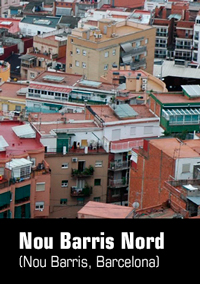 Nou Barris Nord is a segregated neighbourhood that has not overcome its vulnerability. It has been hit extremely hard by the effects of the Great Recession. However, to really understand what has happened in the area we should not focus on how the crisis has affected it (unemployment, foreclosures and so on) but on how these neighbourhoods were transformed prior to the crisis. Nou Barris Nord has always been a disenfranchised urban area. Nevertheless, the real estate bubble multiplied its urban segregation as a result of a huge demographic replacement, and the poorest population in Barcelona became concentrated in this urban area. The social fabric of Nou Barris Nord was fragmented and its social capital declined, while civic capacity evolved into a general mistrust and hostility between, on the one hand, neighbourhood associations and, on the other, the City Council.
Nou Barris Nord is a segregated neighbourhood that has not overcome its vulnerability. It has been hit extremely hard by the effects of the Great Recession. However, to really understand what has happened in the area we should not focus on how the crisis has affected it (unemployment, foreclosures and so on) but on how these neighbourhoods were transformed prior to the crisis. Nou Barris Nord has always been a disenfranchised urban area. Nevertheless, the real estate bubble multiplied its urban segregation as a result of a huge demographic replacement, and the poorest population in Barcelona became concentrated in this urban area. The social fabric of Nou Barris Nord was fragmented and its social capital declined, while civic capacity evolved into a general mistrust and hostility between, on the one hand, neighbourhood associations and, on the other, the City Council.
In this context the emergence of socially innovative responses to problems is not easy. When initiatives flourish, the lack of coordination and collaboration with public authorities hinders their potential social impact. Hence, we found few socially innovative initiatives in Nou Barris Nord and, in general terms, they were small initiatives achieving a low social impact. Rather than being transformative initiatives, the social innovation we found is clearly pragmatic, attempting to address concrete problems related to basic social needs. The residents do not want to solve their collective problems autonomously or using power-based models of social change. They tend to use community development or community building approaches and they essentially ask for greater public investment and the taking of responsibility by public bodies.
At the same time, we also found in Nou Barris Nord a story of struggle based on the neighbourhood’s tradition of collective action. Neighbours, neighbourhood associations and other community-based organizations have clearly responded to recession effects through solidarity and resistance. The anti-evictions movement is probably the best example of that, but we have also identified many other initiatives. Although there is only a small group of engaged neighbours who are fostering such initiatives, their role is essential not only in mitigating the effects of the recession in the area but also in order to foster coexistence and solidarity.